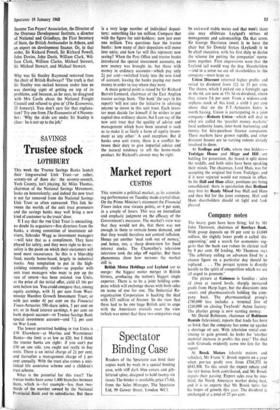Market report
CUSTOS
This remains a political market; as its astonish- ing performance on Tuesday made crystal clear. On the Prime Minister's statement the Financial Times index rose sixteen points, or 4 per cent, in a couple of hours. This was an immediate and emphatic judgment on the efficacy of the Government's measures. The markers view was that they would not do, that there was not enough in them to restrain home demand, and that they would therefore not control inflation. Hence yet another 'mad rush out of money,' and hence, too, a sharp down-turn for fixed interest stocks. The Chancellor's television interview took the edge off equities. But these phenomena show how nervous the market still is.
British Motor Holdings and Leyland are to merge: the biggest motor merger in British history, producing the nation's biggest single exporter. There is to be a joint holding com- pany which will exchange shares with both sides on terms of one for one. The Industrial Re- organisation Corporation is backing the deal with £25 million of finance. So the view that there had to be one huge British unit to cope with the Americans prevails over the view (which was mine) thaf these two companies may be awkward stable mates and that asfies sheer size may obliterate Leyland's virtues of management and salesmanship. On that score, Sir George Harriman (emit) is to have the chair but Sir Donald Stokes (Leyland) is to be chief executive, with his first duty to devise the scheme for putting the companies' opera- tions together. First impressions were that the Leyland tail would wag the dog. Shareholders —and in a sense we are all shareholders in this company—must hope so.
Union Discount returned higher profits and raised its dividend from 124 to 15 per cent. The shares, which I picked out a fortnight ago at 46s 6d, are now at 53s 3d ex-dividend, where they return 5.6 per cent. From a widows-and- orphans stock of this kind, a yield 1 per cent above that on the F.T.-Actuaries Index is worth having. Union is participating in a joint company—Roberts Union—which will deal in what are called the 'parallel money markets,' local authority loans, inter-bank borrowing and money • for hire-purchase finance companies. These markets have grown rapidly, and other discount houses are to varying extents already involved in them.
At Troilope and Coils, where two bidders— Trafalgar House and Higgs and Hill—are battling for possession, the board is split down the middle, and both sides have been speaking their minds. The chairman, Lord Mais, was for accepting the original bid from Trafalgar, and if it were rejected would not remain in office. In the Hall and Ham affair, positions are being consolidated: there is speculation that Redland may first let Ready Mixed buy Hall and Ham and then bid for the joint company. Hall and Ham shareholders should sit tight and look pleased.
Company notes
The heavy guns have been firing; led by Mr John Thomson, chairman of Barclays Bank. With group deposits up 10 per cent to £4,049 million, the slightly lower profit is called 'dis- appointing,' and a search for economies sug- gests that the bank can reduce its clerical staff by 9 per cent. Of lending, Mr Thomson says 'The arbitrary ceiling on advances fixed by a chance figure on a particular day should be replaced. . . . The present system is directly hostile to the spirit of competition which we are all urged to promote.'
The picture at Guinness is familiar : sales of stout at record levels, sharply increased profit from Harp lager, but the diversions into sweets and pharmaceuticals holding the com- pany back. The pharmaceutical group's £780,000 loss includes a terminal loss of £240,000 on closing Twyfords' Acton factory. The plastics group is now earning money.
Mr David Robinson, chairman of Robinson Rentals (television), reports that trade has been so brisk that the company has come up against a shortage of sets. With television rental con- tinuing to gain ground, he looks for 'another material increase in profits this year.' The deal with Granada evidently came too late for the report.
At Brock Motors (electric motors and vehicles), Mr Frank V. Brook reports on a year when pre-tax profit rose from £764,372 to £843,308. To this result the export rebate and the SET bonus both contributed, and Mr Brook regrets their passing. Export sales rose by one- third, the North American market doing best, and it is to exports that Mr Brook turns for his hopes of growth this year. The dividend is unchanged at a total of 25 per cent.


































 Previous page
Previous page